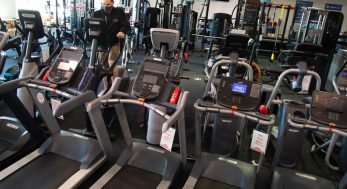Fitness plateau can happen to even the most dedicated of gym-goers, but we’ve got expert insights into how to overcome it.
For many fitness fans, whether they like to focus on cardio, strength or classes, making consistent progress is often a priority. But after a while, there may come a point where you just can’t lift anything heavier, do anymore reps, or run any further.
There are few things more frustrating than plateauing, especially if you’ve been on an upward trajectory for a while. But it’s also natural to reach a point of stagnation and, in some cases, even regression, even if you have been training for a long time.
In fact, according to Dr Sarah Davies from Panacea Health, you are actually more likely to reach a plateau if you have been training for a long time and are already very strong. This has to do with the fact that, “the longer you’ve been training and the stronger you are, the harder it can be to make further progress”.
But that doesn’t mean to say that you have reached your peak and can go no further. When you hit a point of plateau, there are a number of things you can do to pull yourself out of it. So we asked four fitness experts for their advice on how to keep on going when your progress seems to have stalled.
Revisit your goals
Personal trainer Veowna Charles says that “having a clear vision on achievable, realistic goals can improve overall focus”, which can help you get back on track with your fitness. She recommends taking the time to remind yourself of what you want to achieve with each workout, because “understanding your reasoning for wanting to progress is a key to staying motivated”.
However, if you’re struggling to stay on top of your fitness goals, a good way of approaching your workouts is to “focus on training at an effort level”, says personal trainer and founder of the fitness bootcamp TSC Method Tashi Skervin. In other words, “instead of focusing on lifting a certain weight or running at a specific speed”, you train based on how you feel going into your workout. This will help you to ease back into your training following a plateau and “and allows room for recovery”, preventing you from overtraining when your body is tired.
Switch up your training program
One of the key things our fitness experts recommend is making changes to your training program. This doesn’t mean you have to completely abandon your go-to workouts; rather, the key is adapting them so that you can continue to make progress.
Dr Sarah says that changing the exercises you are doing even in subtle ways can be beneficial. Trying out variations can help you work the same muscles in different ways, contributing to optimal, well-rounded development. For example, trying lunge variations, “such as reverse, forward, and rearfoot or forefoot elevated” will help you to continue to build strength in your lower body, and will “relieve some of the psychological monotony of performing the same movement”.
Even just altering the number of sets and reps you do can help refresh your regime and kickstart your progress. Fitness trainer Folusha Oluwajana suggests trying different methods like “drop sets or rest pause sets to improve your strength”, or “switching from continuous running to intervals to help you improve your speed”.
You may also like
How often should you do HIIT? Fitness trainers explain why you should limit your interval training
But whatever you do, remember to leave enough time to recover effectively between workouts. Tashi has found that you are much more likely to hit a plateau “if you train at 100% intensity 100% of the time, with little to no recovery”. So while switching up your routine is a good idea, just make sure you “push hard at the right times and know when to pull back, recover and refuel”.
Assess your lifestyle habits
It’s important to remember that your life outside of the gym has an impact on your performance in the gym, so a healthy lifestyle is crucial. According to Dr Sarah, poor quality of sleep and not eating enough nourishing foods can both be big barriers to fitness progress.
Veowna goes on to explain that “a good night’s sleep, good nutrition and much more can contribute to the effectiveness of your training”. But, if you’re bored with aspects of your lifestyle, Veowna suggests trying new things, like “experimenting with different healthy meal ideas and including outdoor activities to keep you more active throughout the day”, which will help give your motivation a boost.
Don’t forget that stress can have an impact on your progress, too. As Folusha explains, periods of stress “can cause an increase in stress hormones in the body, which impair our ability to recover effectively from training”.
In fact, she says that your focus should not necessarily be on training if you are going through a particularly stressful time, and it certainly should not be on making consistent progress and getting a new PB. Instead, she recommends focusing on managing the stress, using “relaxation techniques, making time for yourself, doing things you enjoy, talking to friends and family, or seeking professional advice”.
Follow @StrongWomenUK on Instagram for the latest workouts, delicious recipes and motivation from your favourite fitness experts.


